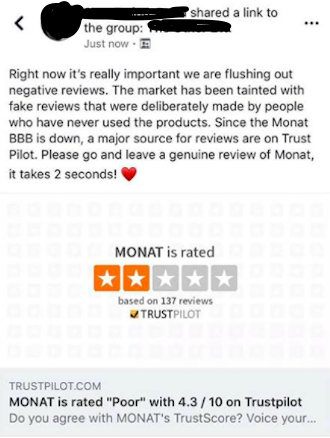Seven lies an MLM rep will tell you – and the REAL truth you need to know
Over the past year we’ve been investigating the MLM business model in depth. And we’ve learned that there is virtually no depth an MLM rep won’t sink to to make a sale or recruit someone into their downline.
In fact, there are some common lies that we hear MLM reps come out with again and again; fabricated or manipulative rebuttals to quite logical objections to their business.
So, to help anyone tempted to buy into a rep’s lies and buy from them or join their business, we thought we’d list seven of the most popular lies – and explain the real truth.
1) Every company is a pyramid scheme
We hear this one far too often. And it’s an ignorant, manipulative lie.
Let’s look at how companies normally work. Small businesses are often run by a boss, who may employ managers, and people under them. Larger corporations are run by a CEO or chairman, with a board of directors, and directors, managers, employees etc under them.
And yes, the higher up that structure you are, the more you earn. However, there’s one key difference to MLMs: everyone gets paid for the work they do. Everyone who works for a company gets a salary, and enjoys employment rights that often include sick pay, holiday, expenses and legal protection.
And while the performance and bonuses of a manager or director may well be judged on the sales (or other KPIs) impacted by the efforts and results of the people working under them, their salary and job security isn’t.
Of course if their team failed over a sustained period of time, their work would be under review. But they’re not at risk of losing their job every single month if their team shrinks in number or doesn’t make their sales target.
In non-MLM companies you don’t find everyone above you pocketing commission directly based on your sales. You also don’t need to pay a company or buy a starter kit to join them. Nor are you usually expected to consume or use the products you sell at your own expense.
And if you need training to do your job better, the company usually pays – both for your time spent training and the actual training itself.
MLMs are nothing like ‘normal’ businesses. An MLM participant is simply an unsalaried sales rep (not a ‘business owner’ as they deludedly call themselves) with zero rights. And to claim that every company is a pyramid scheme just displays the level of brainwashing they’ve been subjected to, or their complete ignorance.
2) My MLM is different
They may sell different products, they may have different level titles (Crystal Emerald Grandmaster Eagle Executive anyone?) and they may structure their incomprehensible bonus schemes differently, but all MLMs promise the same essential lie to dupe recruits:
It’s easy to earn money from home while having fun.
And you have to admit – it would be amazing if that lie were true. (If you’re still under any illusion about this we need to break it to you: it’s not easy to earn big money from home having fun, which is why 99.6% of MLM participants are likely to lose money.)
So it’s understandable that MLM reps, once they’ve bought into the lie, desperately want it to be true. And when one MLM fails, they just switch their faith in that dream to another MLM promising another way to make easy money from home.
Each time they convince themselves that this one is different. This time that dream will come true for them. And because they have to believe that their dream is going to come true, they tell themselves (and everyone else) that this MLM is different.
But it’s not. In a year of investigating MLMs, we have yet to find a single company that is different. They all use the same structure that benefits the tiny fraction of a percent of reps at the top of the pyramid. When you look at the bulk of recruits who make up the bottom of the pyramid, most lose money.
We want to be extremely clear here, there is not one single MLM that we would ever join ourselves, or ever recommend joining.
If you have a passion for a product, love selling or the idea of working for yourself, then start your own business. Find or make your own products to sell. Then you genuinely will be a business owner. And you’ll have control over your pricing, and how and when you’re paid.
Whatever you do, don’t join the MLM merry-go-round and start trotting out that self-delusional lie we hear so many serial reps tell themselves and other people: “My MLM is different.”
3) MLMs are the same as franchise businesses
Clearly any MLM rep who comes out with this excuse has no real idea how franchise businesses work. Do they think McDonalds or Starbucks let anyone open one of their businesses just by investing in a starter kit?
Unlike MLMs, franchises would never saturate a market. Nor would they let any old clueless idiot represent their brand. To buy a franchise you need to go through an application process, and the franchise business carefully monitors how many franchises they sell in any given area.
And yes, you invest far more when you buy a franchise business. But that’s because you’re buying a proper business opportunity, not becoming an unpaid sales rep.
When you open a franchise business you also can be absolutely confident you won’t have any direct competition from the same brand near you. To contrast, this is what MLM LuLaRoe’s retailer map looked like in 2017:

As far as the people running MLMs are concerned, the more reps who pay to join (and then maintain their rank by selling or purchasing products) the better. They don’t really seem to care whether or not they saturate an area – like the small town of Miramichi in Canada which, at one point, had 11 competing online Younique parties and 30 Younique reps.
Franchises also have strict rules about how you represent the brand. However, MLM reps are happy to tell any old lie to hawk products and build a team it seems. Don’t believe us? Just take look at some of the outrageous lies they’ve been caught telling here.
So no, MLMs are nothing at all like franchises.
4) You can’t buy our products in the shops because they’re so special
If a product is really as amazing as MLMs claim to be, why aren’t stores clamouring to stock them? Why aren’t they easily available to every shopper in bricks and mortar stores and online shops?
The answer is because they’re not that amazing.
When you look at the products hawked by MLM reps there’s nothing special about them at all (other than their price, which is usually disproportionately high for their quality). But that’s not what reps will tell you.
They’ll tell you their products are of a unique or superior quality and can only be bought through direct sales for some mysterious reason.
The truth is that companies sell via network marketing because it’s cheaper and easier for them. They don’t need to pitch their often disappointingly sub-average products to retail buyers and compete on-shelf or alongside other products online. They don’t need to pay commission to shops or credit card companies. They don’t need to invest in expensive advertising campaigns to attract customers.
Instead they brainwash a group of people into believing that their products are little short of miraculous, and let them promote and flog them to their friends.
It’s a win-win for the MLM bosses, and lose-lose for most of the reps.
When you examine the quality and claims made by MLM companies, they don’t hold up. Arbonne is apparently not as pure and safe as they claim, doTERRA made up its own certification grade for essential oils and then, surprise, surprise, awarded itself the grade. And Valentus’ weight loss products were apparently deemed ‘illegal’ by Trading Standards.
Over in the US there are class action lawsuits being taken out against MONAT for the damage their products are apparently causing. LuLaRoe, whose leggings allegedly tear “like wet toilet paper” are also being sued. As are Rodan + Fields, who are seemingly facing at least two class action lawsuits for harmful side effects for their Lash Boost eye serum.
By selling products using direct sales, companies can avoid some of the more stringent regulations products need to pass, and save money on advertising and commission. They rely on the fervent loyalty of their reps (and sunk cost fallacy keeping some of their doubting reps loyal), and let them invest their own time, money and effort, and do their sales job for them.
5) Competitions, awards and glowing reviews prove my MLM is amazing
As we explained in this article, we’re never surprised when MLMs win competitions, get named by companies like Which? as one of the leaders in their market, and have glowing reviews on sites like Trustpilot.
Why? Because unlike every other business model, MLMs’ real customers are their reps. Which means their ‘customers’ have a vested interest in the company winning or being seen in a positive light.
Every other company relies on genuine customers being so happy with their products that they’re motivated for no reason other than goodwill to nominate or vote for them, or leave a fantastic review. An MLM, on the other hand, has an army of reps desperate to make money from their products. Reps who are highly motivated to nominate and vote – and who will encourage everyone they know to do the same.
This results in an un-level playing field, on which MLMs have a grossly unfair advantage. It could explain why Utility Warehouse came out top out of 31 utility companies in the Which? energy customer survey (the score was decided by customer reviews). (You can read a more honest – in our view – appraisal of the company here.)
And we believe it’s why MLM companies dominate the annual Pure Beauty Awards, which are also decided by customer votes. (We did contact the organisers of the awards last year and point out that, in our opinion, by allowing MLMs to enter, their awards are effectively ‘fixed’.)
MLM companies have also been known to tell their reps to bombard an independent review site with positive reviews if their score gets too low. Here’s a post that was shared by MONAT reps:

Indeed, in the case of MONAT, the Better Business Bureau (BBB) received so many suspiciously positive reviews in a short period of time, it was forced to suspend all new reviews:

So when an MLM rep tells you that their products must be fantastic because they’ve won an award, have been named as the best supplier, or have brilliant reviews, don’t take that as independent verification they are any good.
6) Anyone who criticises MLMs is a hater and a bitter, jealous failure
This one always makes us laugh, because we’ve personally never joined an MLM; we’re too smart to.
We see straight through the lies MLMs tell and can easily see it’s a business model that favours a very tiny percentage at the top of their pyramid-shaped business structure (just look at any income disclosure statement and you’ll see why they’re referred to as pyramid schemes).
We’d also never want to sell our soul, as we believe you would need to, to succeed in an MLM. We’d hate to see every acquaintance and interaction with someone as a chance to make money, and to be encouraged to badger old acquaintances and fake friendships and caring just to make a sale.
If the MLM business model worked fairly for all participants (reps and customers), we’d be delighted. We’d be promoting it as an opportunity on our website. But it doesn’t, so we don’t. The real truth is that research shows that an average of 99.6% of participants in an MLM will lose money. That is why we campaign against them.
So no, we’re not a ‘hater’. And we’re not a bitter, jealous failure. Like most of the anti-MLM campaigners we know, we simply want to protect people from the predatory businesses and reps who want to lure them into schemes that are unlikely to deliver the rewards they’re promised. And stop them racking up secret credit card debts of over £30,000, like one woman we spoke to last week.
Telling people that dissenters or critics are just bitter haters and to ignore them is a strategy that cults use to prevent critical thinking, and ensure recruits remain brainwashed. It’s one of many similarities we see between MLMs and cults.
MLM companies and their reps are afraid that if prospects see the real facts – like the minuscule probability they’ll ever make any money – they’ll walk away. So they try to discredit anyone speaking the truth.
Talking of the truth, let’s look at some statistics regarding an MLM rep’s likelihood of income (these are all based on income disclosure reports and other statistics from the companies concerned and their reps):
- We calculate that the average Younique rep makes $14.26 a month before expenses
- Of 1,000 people who join an MLM, 996 will lose money after subtracting expenses
- 99.997% of people working on behalf of Nu Skin made either no profit or a loss
- 88% of Herbalife distributors make no commissions
- In reality very, very few people make ANY money from Arbonne
- The typical Stella&Dot stylist (including inactives) during 2015 earned between $0 to $100
7) If MLMs are such a terrible business model, why did Richard Branson run one?
While it’s true that Richard Branson did briefly run a cosmetics party business called Virgin Vie at home, the key word to note here is ‘run’. Yes, that’s past tense.
If network marketing was such a brilliant business model, why didn’t one of today’s most successful entrepreneurs continue it? In fact, Virgin Vie at home Ltd filed for liquidation in August 2011, writing off over £2 million of debt owed to suppliers and HMRC.
Not only that, but the Virgin Group even paid £8.8 million to remove the Virgin name from the company in 2009, and wrote off £21 million in loans.
So, not one of Branson’s biggest successes. There’s also a significant difference between starting and owning an MLM, and being a rep joining at the bottom. Yes MLMs can be hugely financially successful, but as we’ve proved in our income disclosure investigations, and as this in-depth research discovers, an average of 99.6% of participants in an MLM will lose money.
Tellingly Richard Branson hasn’t started another MLM since Virgin Vie at home filed for liquidation. That should be all the message you need about the validity of the business model.
Don’t buy the lies – avoid MLMs at all cost
In a year of investigating the MLM business model, we haven’t found one that we’d consider or recommend joining. Nor one we’d buy from out of choice (MLM products are usually more expensive than higher quality alternatives available on the high street or online).
In fact, the more lies and bad behaviour we uncover, both from MLM companies themselves and their armies of reps (just take a look at the outrageous lies MLM reps have been caught shamelessly peddling) the more we despise the industry, and the more determined we become to raise awareness of common practices, and hopefully save more people from losing money to one.
Learn more about MLMs
There’s a growing army of campaigners raising awareness of MLMs. Here are a few resources we recommend checking out:
- Elle Beau
- The Anti-MLM Coalition
- Botwatch
- Timeless Vie
- Anti-MLM Reddit
- Pyramid Scheme Alert
- ‘MLM’ The American Dream Made Nightmare
- Ethan Vanderbuilt
- Betting on Zero
- MLM Lies Exposed
- The Art of Manliness
Photo by Alicia Steels










